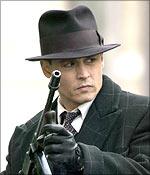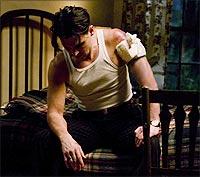 | « Back to article | Print this article |
 This much we should know by now -- all motion pictures are make-believe; even those that purport to be based on real-life events. And the entire mechanism of a film production is geared towards building the safest environment for the actors to perform in so that the illusion is maintained. Depending upon how successful the performers have been in disappearing into their characters, the audience is captivated (or turned off) by the story onscreen.
This much we should know by now -- all motion pictures are make-believe; even those that purport to be based on real-life events. And the entire mechanism of a film production is geared towards building the safest environment for the actors to perform in so that the illusion is maintained. Depending upon how successful the performers have been in disappearing into their characters, the audience is captivated (or turned off) by the story onscreen.
A majority of big budget Hollywood movies are shot on 35mm film and superficially speaking, the texture of the celluloid as well as the quality of camera lenses used to shoot such a film contribute to the maintenance of the illusion, on a visual level.
Since Collateral in 2004 however, director Michael Mann has increasingly deployed high-definition digital cameras in the making of his movies. Several big name directors are adopting these digital cameras in their filmmaking process and while there are several advantages to the new technology, there are also certain drawbacks -- primary among which is the 'look' of the finished product. If the proper care is not taken, a picture can end up looking like a very expensive home video. As most people who have watched amateur home video will testify, it is very difficult to mask bad acting on home video.
That in a nutshell is the problem with Public Enemies -- it looks like somebody snuck a high-definition video camera into 1930s America and suddenly everybody became boring. Remember The Untouchables? This movie is nothing like it.
Public Enemies chronicles the American authorities' attempts to end the crime spree of a group of criminals led by John Dillinger (Johnny Depp), a flamboyant bank robber who broke into banks and out of prisons with alarming ease. Turning Dillinger into Public Enemy Number One in the eyes of the public helped J Edgar Hoover (Billy Crudup) push forward his agenda of establishing a Federal task force that later mutated into the FBI. He placed Melvin Purvis (Christian Bale), essentially an encounter cop from the 30s, at the head of the mission to catch Dillinger. All of which makes for potentially good cops-and-gangsters drama of the type people have enjoyed watching for years.
However, the way this movie is shot, and edited together, it is just difficult to watch. The whole enterprise plays out like a rather boring documentary in which people say stuff, fire guns, talk some more, fire some more guns and occasionally die.
 Mann sticks to his formula of filling his movies with familiar faces and there is probably a decent drinking game to be played out of identifying actors and where one saw them last (I counted people from the TV shows Lost and Entourage, and movies like Snatch, 300 and Fast & Furious).
Mann sticks to his formula of filling his movies with familiar faces and there is probably a decent drinking game to be played out of identifying actors and where one saw them last (I counted people from the TV shows Lost and Entourage, and movies like Snatch, 300 and Fast & Furious).
The performers aren't really given room to shine and the great and good alike are reduced to mouthing lines and rearranging their features into a range of expressions that is alarmingly narrow. Johnny Depp plays Johnny Depp yet again and that knowing smirk he wears for most of the movie does nobody any favours, especially in a movie that is working so hard to stay interesting. Christian Bale looks like he forgot he's not wearing the Batsuit anymore and holds a single expression for pretty much the whole movie.
There is one scene of confrontation between Depp's Dillinger and Bale's Purvis, and quite like that much ballyhooed scene in Heat where Mann put De Niro and Pacino face-to-face for the first time in a motion picture, one can't help wishing that this movie had more moments like that. The only genuine emotional moment is provided by French actress Marion Cotillard when she receives a message towards the end of the movie. The way her expressions morph in those moments offers justification for the Oscar award she won last year.
The most telling contrast between this movie and a scene within the film itself obviously went unappreciated by the filmmakers. After a late-night picture show audience members file out of that 1930s movie hall with a smile upon their faces. They have just watched a gangster flick that didn't end well. But those people looked entertained. I don't think the same fate will visit those who brave this movie at the cinemas this weekend. I know I wish I had re-watched the director's earlier efforts instead.
Rediff Rating: 